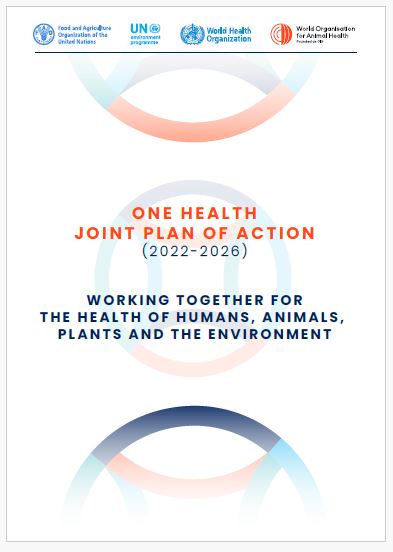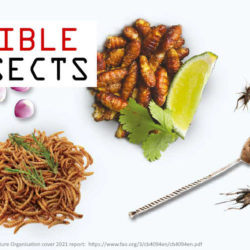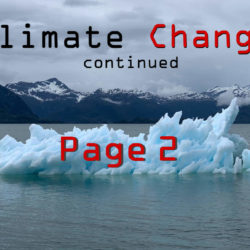This page will track the formation and development of the Wildlife Conservation Society’s (WCS) One World, One Health™ agenda which has morphed into a United Nations Quadripartite push between the Food and Agriculture Organization of the United Nations (FAO), World Health Organization (WHO), the World Organisation for Animal Health (WOAH) and recently the United Nations Environment Programme (UNEP).
In January 2022, the World Health Organisation takes a “paradigm shift” and adopts the “One Health” approach stating “Engagement in One Health is growing”. In their words One Health is “an integrated, unifying approach that aims to sustainably balance and optimize the health of people, animals and ecosystems. It recognizes that the health of humans, domestic and wild animals, plants, and the wider environment (including ecosystems) are closely linked and interdependent.” – WEB
What does OneHealth mean for our sovereignty?
The System loves the vaccine passport because as soon as they can impose it they’re going to turn it into your money …your vaccine wallet…vaccine passport is the excuse to bring [social credit score model] in.
This is primarily about control, this is not about your health. If it was about your health they would have done things right during COVID…they want to do more of the bad stuff…
There’s something called OneHealth which enables the director general of the WHO to declare emergencies that are not health emergencies. They can be climate emergencies, or ecosystem emergencies, or gun violence emergencies…anyway you can call health of humans, animals or ecosystems, or plants…they can then impose rules on us for.
Dr Meryl Nass, March 8, 2024
The OneHealth Agenda timeline
The agenda seems to trace back to a September 2002 article in Foreign Affairs magazine written by the head of the WCS, justifying why the conservation movement needs to lead a global response in connecting the “triangle of wildlife health, domestic animal health, and human health.” The following year his Society coined the term “One Health”.
- One World One Health -website ARCHIVE
- One Health Commission website – HERE, History – HERE
- One Health Global Network “Milestones” – HERE
- The International Journal of Infectious Diseases (IJID) One Health (OH), an open access, peer-reviewed journal published monthly online by the International Society for Infectious Diseases (ISID) – READ, see 2007
- EcoHealth Journal – Public Health Official journal of EcoHealth Alliance – (One Health) – READ
- Australian Govenment: Australian Centre for International Agricultural Research on One Health – READ, SEARCH, AIRPOH w/ Canada – HERE
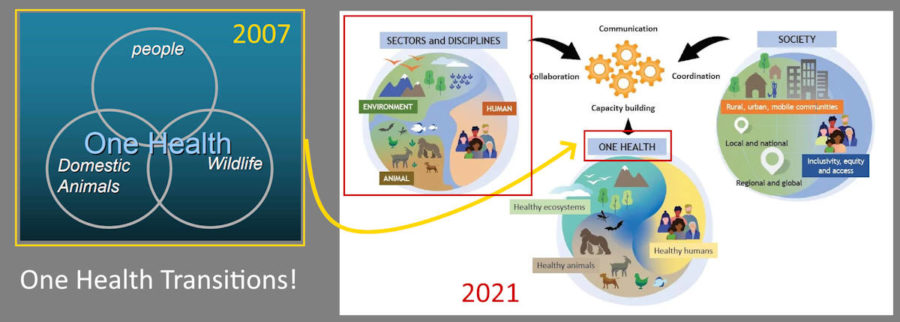
Australia hosted the First International OneHealth Congress in 2011
Links in reverse chronological order
2024
December 3-6, 2024 (scheduled) – ProMED: 20th International Congress on Infectious Diseases (ICID) 2024 | Cape Town, South Africa – features an expanded range of sessions by bringing the One Health aspect to the world of clinical infectious diseases and microbiology. Looking through the One Health lens – READ, ARCHIVE
- “The recent COVID-19 pandemic highlights the importance of the need for continued research, innovation, and funding in the field of infectious diseases” [of course it does!]. ProMED and SARS-CoV-2 – READ
September 20-23, 2024 (scheduled) – World One Health Conference, Cape Town, South Africa – READ, CREDIT
April 17, 2024 – Meryl Nass: US Government bribes 100 countries to agree to the global biosecurity agenda, and openly reveals that One Health will be used to control food, economic development and climate – READ
- Whitehouse REPORT: US Government Global Health Security Strategy 2024 (April 2024) – PDF, ARCHIVE
- “…because health security, economic security, climate security, and national security are all related.”
…they really are using the “health” hook to wrap up the food supply, economic development, plants and animals…into one neat “thing” they plan to control in the name of preventing zoonotic disease spillover. [Disease X]
They aren’t even trying to hide it anymore
Dr Meryl Nass
March 8, 2024 – The Kim Iversen Show: This Doctor Proved They’ve Been Doing Biowarefare For Decades. Now They’re Censoring Her – WATCH
- Dr Meryl Nass explains how WHO vaccine passports will become a digital wallet together interlinked with the pandemic treaty/IHR and OneHealth – it threaten us all – EXCERPT
The System loves the vaccine passport because as soon as they can impose it they’re going to turn it into your money …your vaccine wallet…vaccine passport is the excuse to bring [social credit score model] in.
This is primarily about control, this is not about your health. If it was about your health they would have done things right during COVID…they want to do more of the bad stuff…
There’s something called OneHealth which enables the director general of the WHO to declare emergencies that are not health emergencies. They can be climate emergencies, or ecosystem emergencies, or gun violence emergencies…anyway you can call health of humans, animals or ecosystems, or plants…they can then impose rules on us for.
Dr Meryl Nass
February 8, 2024 – A Midwestern Doctor Substack: Why The Bioweapons Research Industry Is A Danger to Society and what the WHO is doing to protect this grift now that the public is wising up to it. – One Health etc – READ
- “…fears have been used to create the justification we need to perform an endless amount of bioweapons research to “prevent” the next pandemic.
- “Since the public is gradually becoming aware of what COVID cartel has done to us, they are switching to far more totalitarian methods to ensure they can continue their grift. We are at a pivotal moment to stop that, and that is why this series was written.
- “…given how easy experts are to buy off (as we all saw throughout the pandemic), it was clear to any seasoned observer that One Health was simply an attempt to merge the war on infectious diseases with the war on future environmental catastrophe and have “One Health” usurp the ability of the common people to speak out against it—as under the incredibly broad definition of “One Health,” almost every aspect of our lives was something which could be regulated under it (e.g., you can’t live here because it might increase the chance of you coming in contact with a wild animal that could spark a pandemic)….most of “One Health” is a series of deceptive promises wrapped in doublespeak which simply serve the billionaire class and do anything but promote health” – REF
January 28, 2024 – Meryl Nass Substack: “One Health” has an earlier pedigree than I knew. The false narratives emanating from One health had already been created by 2004, and one author of this drivel now works at EcoHealth Alliance – READ, inspired data point TIMELINE
- William H. Foege, a Fellow at the Bill & Melinda Gates Foundation gave the Keynote Speech: “One World, One Health, Could We Muddle Through?” – REF
2022
December 6, 2022 – Meryl Nass Substack: One Health: what is it and why is it important? One Health is being embedded into the WHO’s International Health Regulations (IHRs) and Pandemic Treaty/Accord – READ
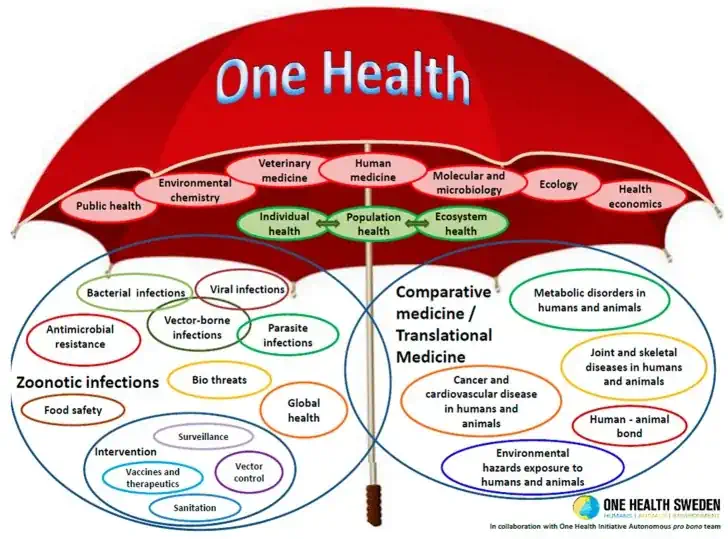
2022 – FAO: Rome: One Health Joint Plan of Action (2022-2026) – Working Together for the Health of Humans, Animals, Plants and the Environment – PDF, READ, READ
January 30, 2022 – WHO: On World NTD Day, WHO releases key document to guide a paradigm shift towards One Health – ARCHIVE
- The “Road Map” Document: Ending the neglect to attain the sustainable development goals. One health: approach for action against neglected tropical diseases 2021-2030 – ARCHIVE
- In an “efforts to control and eliminate neglected tropical diseases (NTDs)”. [It will move to Disease X soon enough]
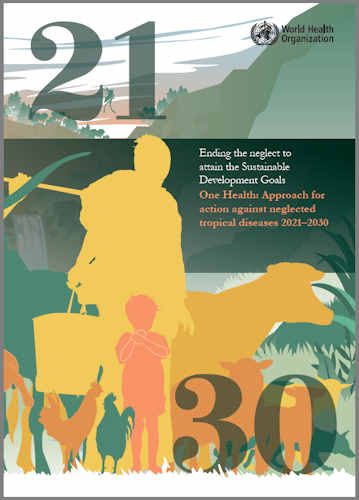
2021
December 2021 – Global One Health Community: The Quadripartite (Food and Agriculture Organization of the United Nations (FAO), United Nations Environment Programme (UNEP), World Health Organization (WHO), and the World Organisation for Animal Health (WOAH)) welcomed the newly formed operational definition of One Health from their advisory panel, the One Health High Level Expert Panel (OHHLEP) – READ
One Health is an integrated, unifying approach that aims to sustainably balance and optimize the health of people, animals and ecosystems.
It recognizes the health of humans, domestic and wild animals, plants, and the wider environment (including ecosystems) are closely linked and inter-dependent.
The approach mobilizes multiple sectors, disciplines and communities at varying levels of society to work together to foster well-being and tackle threats to health and ecosystems, while addressing the collective need for clean water, energy and air, safe and nutritious food, taking action on climate change, and contributing to sustainable development.
Definition of One Health, developed by the One Health High Level Expert Panel (OHHLEP), PDF
September 6, 2021 – Indo Pacific Health Security: Australian expert appointed to One Health High Level Expert Advisory Panel – Professor John Mackenzie, a member of the Centre’s Technical Reference Group, – READ, Members- HERE
- The panel was established jointly by the UN Food and Agriculture Organisation (FAO), the World Organization for Animal Health, the United Nations Environment Programme (UNEP) and the World Health Organization (WHO) Launched May 2021
February 2021 : The Tripartite organisations FAO, WHO and WOAH, who had been together for 27 years (since 1994?), called on the United Nations Environment Programme (UNEP) to join their effort “reaffirming the importance of the environmental dimension of the One Health collaboration.” – PDF
- UNEP agreed to jointly develop a strategy and action plan to prevent future pandemics through the One Health approach ->
- Rome 2022: One Health Joint Plan of Action (2022-2026) – Working Together for the Health of Humans, Animals, Plants and the Environment – PDF
2020
March 23, 2020 – How ProMED Crowdsourced the Arrival of Covid-19 and SARS – READ [One Health surveillance]
- Marjorie Pollack, a physician, epidemiologist and deputy editor of ProMED got email alert from China
March 11, 2020 – Scientific American: How China’s “Bat Woman” Hunted Down Viruses from SARS to the New Coronavirus – READ
- Once potential pathogens are mapped out, scientists and public health officials can regularly check for possible infections by analyzing blood and swab samples from livestock, wild animals that are farmed and traded, and high-risk human populations…This approach, known as “One Health,” says Peter Daszak
2017
March 2017 – Research Gate: Roadmap to a One Health Agenda 2030 – READ, SOURCE
2016
November 3, 2016 – One Health Commission PRESS RELEASE: GLOBAL “ONE HEALTH DAY” PLANNED BY THREE INTERNATIONAL ONE HEALTH GROUPS – READ, They’ve designated November 3, “One Health Day” – READ, CREDIT
- One Health Day is celebrated through One Health educational and awareness events held around the world.
2011
February 14-16, 2011 – 1st International One Health Congress: Human Health, Animal Health, the Environment and Global Survival in Melbourne, Australia – to Showcase the One Health concept globally, to open debate to the wider international scientific and policy making community – ARCHIVE, REF, WEB, Report – PDF
- Focus on outcomes needed to effectively manage growing risks to global health & make global policy recommendations and organizational changes, using underlying science, to drive real and profound change.
- Co-Chaired by Professor John Mackenzie, who happens to have been on WHO emergency committee who decided SARS-CoV-2 was a PHEIC – READ, TIMELINE, in 2021 australia appoints him head of One Health advisory panel! – READ
- “Professor Peter Doherty’s keynote speech dealt with the growing evidence of negative impact of human behavior on the health of the world and the likely risk to humankind.” – REF
- Published EcoHealth Journal: 2011, Volume 7, Supplement – “One Health – Ecology & Health – Public Health Official journal of EcoHealth Alliance”: 1st International One Health Congress – READ
- “One Health case studies, from all continents…There is clearly a “One Health movement” starting out there” – REF
2010
July 2010 – United Nations and World Bank Fifth Global Progress Report: Animal and Pandemic Influenza; A framework for Sustaining Momentum – The adoption of “One Health approaches” is one of the three suggested mainstreams of the “framework for sustaining momentum”– REF
May 2010 – Stone Mountain meeting (Atlanta, Georgia): Operationalizing One Health: a Policy Perspective -taking stock and shaping an implementation roadmap, One Health working groups are set up, with 3-year time operational objectives. – REF
April 21, 2010 – UNited Nations: Hanoi Declaration Sets Global Framework for Avian Influenza, Pandemic Readiness, Proposes National Steps to Detect Animal-Human Transmission, Control Outbreaks – READ
2008
October 2008 – 6th International Ministerial Conference on Avian and Pandemic Influenza at Sharm-el-Sheikh – READ “One Health becomes a political reality and a recommended approach“
- “In 2008, the three major international organizations charged with animal health and human health—FAO, OIE and WHO—collaborated with UNICEF, the UN System for Influenza Coordinator, and the World Bank to develop a joint strategic framework in response to the evolving risk of emerging and re-emerging infectious diseases.
- The document communicating this framework, ‘Contributing to One World, One Health—A Strategic Framework for Reducing Risks of Infectious Diseases at the Animal-Human-Ecosystems Interface,’ was officially released”
2007
December 2007 – International Ministerial Conference on Avian and Pandemic Influenza (IMCAPI) of New Delhi – REF
- “Promoting One Health could be the natural extension of the Global Response to Avian Influenza (GRAI).” it is set in stone the next year!
October 2-4, 2007 – WCS: One World-One Health: Brazil 2007 Symposium- Healthy Ecosystems, Livestock and Human Livelihoods: An Innovative Public-Private Partnership – ARCHIVE, Agenda – ARCHIVE
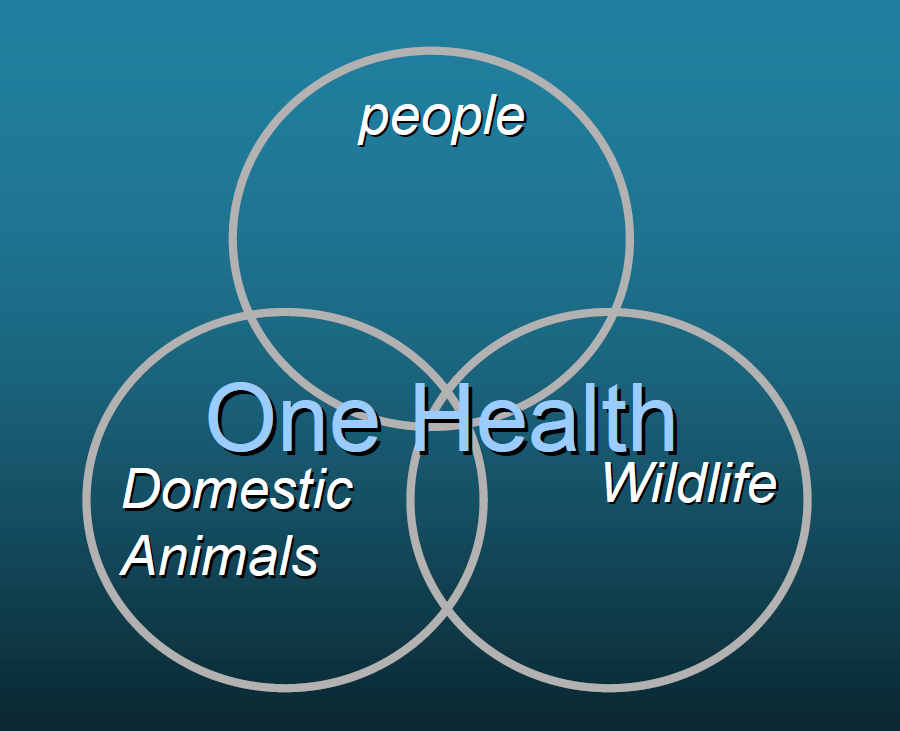
And this is how “conservations” gets involved in human health – SLIDE
- Building upon the successful model of our previous One World – One Health symposia in New York, Bangkok and Beijing, we are now introducing this multidisciplinary approach to health and livelihoods to Brazil.
- William Karesh, linking disease to population, land, conservation.
- One World – One Health – One Surveillance System (aka ProMED mail) – READ, SLIDES
- Wildlife Conservation Society Announces One World One Health Research Projects Funded by Cargill
2005
November 30, 2005 – The Lancet: Potential of cooperation between human and animal health to strengthen health systems – Zinsstag et al – READ
- The WHO ministerial summit held in Mexico City, Mexico, on Nov 16–20, 2004, recognised the pivotal role of strengthened health systems in achieving the Millennium Development Goals (MDGs) in an equity-effective manner
- US epidemiologist Calvin Schwabe coined the term “one medicine”, to focus attention on the similarity between human and veterinary health interests – Historical roots of the “one medicine”
2005 – WCS: Conservation and Development Interventions at the Wildlife/Livestock Interface: Implications for Wildlife, Livestock and Human Health – by Osofsky, Karesh et al – READ
2004
November 15, 2004 – Thialand Workshop prior to World Conservation Congress: Beyond Zoonoses: One World – One Health, The Threat of Emerging Diseases to Human Security and Conservation, and the Implications for Public Policy – ARCHIVE, Presentations – ARCHIVE
September 29, 2004 – Wildlife Conservation Society (WCS): One World, One Health: Building Interdisciplinary Bridges to Health in a Globalized World – Symposium organised by WCS, hosted by The Rockefeller University, Caspary Auditorium – ARCHIVE, TIMELINE by Robert A. Cook, William B. Karesh, and Steven A. Osofsky of the Wildlife Conservation Society, Bronx, New York, USA
- Represented by the World Health Organization(WHO); the UN Food and Agriculture Organization (FAO); the Centers for Disease Control and Prevention (CDC); the United States Geological Survey National Wildlife Health Center; the United States Department of Agriculture (USDA); the Canadian Cooperative Wildlife Health Centre; the Laboratoire Nationale de Sante Publique of Brazzaville, Republic of Congo; the IUCN Commission on Environmental Law; and the Wildlife Conservation Society and more
- Health experts from around the world met … for a symposium focused on the current and potential movements of diseases among human, domestic animal, and wildlife populations…[The] assembled expert panelists delineated priorities for an international, interdisciplinary approach for combating threats to the health of life on Earth
- The product—called the “Manhattan Principles” by the organizers of the “One World, One Health” event, lists 12 recommendations for world’s leaders, civil society, the global health community and institutions of science for establishing a more holistic approach to preventing epidemic / epizootic disease and for maintaining ecosystem integrity for the benefit of humans, their domesticated animals, and the foundational biodiversity that supports us all. – READ
- “The key theme of this conference was that given the dire urgency of the environmental and biological threats we faced, all major “One Health” decisions would need to be made by a panel of multidisciplinary experts.” – REF
2003
September 14-15, 2003 – WCS: IUCN 2003 World Parks Congress AHEAD Launch Forum | Durban, South Africa – “Southern and East African Experts Panel on Designing Successful Conservation and Development Interventions at the Wildlife/Livestock Interface: Implications for Wildlife, Livestock, and Human Health” – READ, ARCHIVE, ARCHIVE, Briefing Booklet – ARCHIVE
- The Wildlife Conservation Society (WCS), IUCN Veterinary Specialist Group (VSG), and other partners helped to start the initiative is called AHEAD – Animal Health for the Environment And Development, in recognition of the importance of animal health to both conservation and development interests. …”Around the world, domestic and wild animals are coming into ever-more-intimate contact… without adequate scientific knowledge and planning, the consequences can be detrimental on one or both sides of the proverbial fence. But armed with the tools that the health sciences provide, conservation and development objectives have a much greater chance of being realized – particularly at the critical wildlife/livestock intersection, where conservation and agricultural interests meet head-on.” – REF [a prelude to One Health]
- “To date, neither the nongovernmental organizations nor the aid community nor academia have holistically addressed the landscape-level nexus represented by the triangle of wildlife health, domestic animal health, and human health.“
- AHEAD publications – ARCHIVES
- IUCN Occasional Paper No. 30 – Conservation and Development Interventions at the Wildlife/Livestock Interface: Implications for Wildlife, Livestock and Human Health – by Osofsky, Karesh et al – READ
- Introduction “Looking AHEAD While Looking Back” by Osofsky – PDF, SOURCE
- “As socioeconomic progress demands sustained improvements in health for people, their domestic animals, and the environment, we hope we’ve been successful in drawing attention to the need to move towards a “one health” perspective – an approach that was the foundation of our discussions in Durban, and a theme pervading this Proceedings.”
2002
December 7, 2002 – First archive page of the Wildlife Conservation Society’s Field Veterinary Program (VFP): Said to be the architects of Global Approach to Health – ARCHIVE
October 25, 2002 – National Geographic News: Human “Footprint” Seen on 83 Percent of Earth’s Land – READ, WCS Human Footprint Map – READ
September/October 2002 – Foreign Affairs magazine | Volume 81, Number 5: The Future of Conservation – A New Conservation Agenda is needed – By Dr. Steven Sanderson, President of the Wildlife Conservation Society – READ, SOURCE
- Setting the justification for conservation (specifically Wildlife Conservation Society) to develop and lead a new global agenda. [Find an “unmet need” and exploit it – see Sept 2003 the “triangle of wildlife health, domestic animal health, and human health.“
2001
January 24, 2001 – Steven E. Sanderson, a political scientits, is named President and CEO of The Wildlife Conservation Society – READ Sanderson is highly involved in the creating of One Health.
1994
1994 – The Program for Monitoring Emerging Diseases (ProMED) is a program of the International Society for Infectious Diseases (ISID), it was launched in 1994 as an Internet service to identify unusual health events related to emerging and re-emerging infectious diseases and toxins affecting humans, animals and plants – REF, it becomes part of One Health disease surveillance program.
- International Congress on Infectious Diseases (ICID) was established in 1983 as a scientific assembly for the exchange of research and clinical information in infectious diseases, and in 1986 it merged with The International Federation on Infectious and Parasitic Diseases (IFIPD) and became the Society- READ
- ISID journal began ~1996 – ISSUES
1989
1989 – The WCS Field Veterinary Program (FVP), established in 1989 – REF
1966
Under the leadership of William Conway as General Director of the WCS in 1966 and then President in 1992 the field conservation programs expanded throughout the world – REF
1895
The Wildlife Conservation Society (WCS) traces its origin to April 26,1895 when New York State chartered the New York Zoological Society. WCS is based at the Bronx Zoo! – REF


